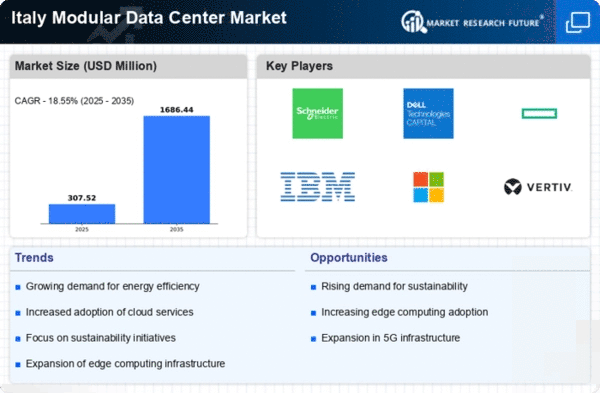Increased Adoption of Cloud Services
The growing reliance on cloud services in Italy is driving the modular data-center market. As businesses increasingly migrate their operations to the cloud, the demand for flexible and scalable data solutions rises. Modular data centers offer the agility needed to support cloud infrastructure, allowing companies to expand their capabilities without significant upfront investments. In 2025, the cloud computing market in Italy is projected to reach approximately €10 billion, indicating a robust growth trajectory. This trend suggests that modular data centers will play a crucial role in accommodating the expanding data storage and processing needs of cloud service providers, thereby enhancing the overall efficiency of IT operations.
Demand for Disaster Recovery Solutions
The increasing frequency of natural disasters and cyber threats in Italy is driving the need for robust disaster recovery solutions, thereby influencing the modular data-center market. Modular data centers provide businesses with the flexibility to establish redundant systems and backup facilities, ensuring data integrity and availability during crises. This capability is particularly crucial for sectors such as finance and healthcare, where data loss can have severe consequences. As organizations prioritize business continuity planning, the demand for modular data centers that offer reliable disaster recovery options is expected to grow. Analysts predict that this segment of the market could expand by 18% in the near future.
Regulatory Compliance and Data Sovereignty
Italy's stringent data protection regulations, including the General Data Protection Regulation (GDPR), necessitate that businesses ensure compliance with data sovereignty laws. This regulatory landscape is propelling the modular data-center market, as these facilities can be designed to meet specific compliance requirements. Modular data centers can be strategically located to ensure data remains within national borders, thus addressing concerns related to data privacy and security. As organizations strive to adhere to these regulations, the demand for modular solutions that facilitate compliance is likely to increase, potentially leading to a market growth of around 15% in the coming years.
Rising Energy Costs and Sustainability Initiatives
The escalating energy costs in Italy are prompting businesses to seek more energy-efficient solutions, thereby influencing the modular data-center market. Modular data centers are designed with energy efficiency in mind, often utilizing advanced cooling technologies and renewable energy sources. This focus on sustainability aligns with Italy's commitment to reducing carbon emissions and promoting green technologies. As organizations aim to lower operational costs and enhance their sustainability profiles, the adoption of modular data centers is expected to rise. It is estimated that energy-efficient data centers can reduce energy consumption by up to 30%, making them an attractive option for businesses looking to optimize their energy usage.
Technological Advancements in Data Center Infrastructure
Innovations in data center technology are significantly impacting the modular data-center market. The introduction of advanced cooling systems, virtualization technologies, and automation tools enhances the performance and reliability of modular data centers. These advancements enable businesses to optimize their IT infrastructure, reduce downtime, and improve overall operational efficiency. In Italy, the increasing integration of artificial intelligence and machine learning in data center management is likely to drive further adoption of modular solutions. As companies seek to leverage these technologies, the modular data-center market may experience a growth rate of approximately 20% over the next few years.
















